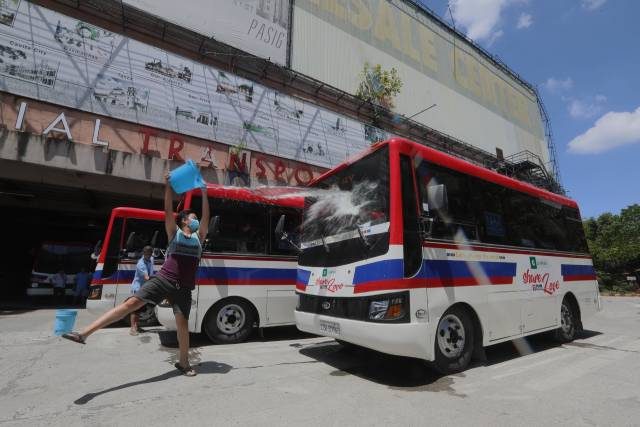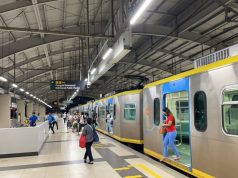
Several fund-raising drives for jeepney drivers continued online after many of them are still not allowed to work amid the general community quarantine.
According to the Department of Transportation’s announcement before the GCQ phase, two phases of mass transport will be implemented in Metro Manila for the month of June. All domestic flights between GCQ places have also been partially resumed.
Trains, tricycles and public city buses have been allowed to operate since the start of June as part of the first phase from June 1 to 21.
The suspension on jeepneys, UV express vans and provincial buses, meanwhile, were scheduled to be lifted last June 21. Phase 2 started from June 22 to 30.
However, during the virtual House Committee hearing on Metro Manila Development, the Land Transportation Franchising and Regulatory Board announced that the operations of both UV express vans and traditional jeepneys will only start next week, Monday.
“For Monday, may bubuksan na mga UV, and then followed by the traditional jeepney,” LTFRB Chair Martin Delgra said.
Given the drivers’ nearly three months of financial losses, some volunteer groups and concerned Filipinos continued to seek more donations to their fund-raising initiatives to help them cope in the meantime.
Donations for the drivers
Facebook group “Tsuper Man: A Donation Drive for Calamba Jeepney Drivers” was created specifically to raise funds for jeepney drivers in Calamba City in Laguna.
Magandang araw po sa lahat! Kami po ay kasalukuyang nagsasagawa ng donation drive para sa jeepney drivers sa Calamba…
Posted by Tsuper Man: A Donation Drive for Calamba Jeepney Drivers on Sunday, June 14, 2020
In a statement on June 14, the group announced that they aimed to help the drivers of Calamba from the barangay level during the duration of the novel coronavirus pandemic.
“Kami po ay kasalukuyang nagsisimula sa Barangay Halang, at mula sa inyong malasakit ay hangad naming mapalawig pa ang proyektong ito hanggang sa mga karatig barangay upang mas marami pa tayong matulungang jeepney drivers,” they said.
They also posted an innovative publication material citing the relief goods that can be donated such as three kilograms of rice, two cans of beef loaf and corned beef, and 10 packs of 3-in-1 coffee.
A youth group called Tayo Kabataan also launched a own donation drive last June 16 and posted the bank accounts where Filipinos can course their cash donations through.
Bayanihan para kay Manong Jeepney Driver!
Para! Kay Manong Tsuper: Donation Driver for Jeepney Drivers!Libo-libong…
Posted by Tayo Kabataan on Tuesday, June 16, 2020
The government should come up with a more coordinated plan to help jeepney drivers instead of phasing out their units, the group said.
“Bagamat maganda ang ganitong inisyatibo, kami pa rin ang naninindigan na magkaroon nang maayos na plano ang gobyerno para sa mga jeepney drivers. Panawagan din natin ang pagpapatigil ng posiblenv pag-phaseout ng mga jeepney sa Pilipinas,” their post read.
Last June 22 on Twitter, another youth group called Tulong Kabataan Network also shared details where the public can donate for the jeepney drivers, particularly those who resorted to seek for alms on the streets or contact them for sponsorships and partnerships.
ANO BA ANG NEW NORMAL NG MGA TSUPER?
Ang mawalan ng kabuhayan?
Ang mamalimos sa kalsada?
Ang maiwan sa pag – ahon ng ekonomiya?
Mga kabataan at puso – kabataan, tulungan natin ang ating mga tsuper! #TulongKabataan#NoToJeepneyPhaseout pic.twitter.com/oUZzONRgWE
— Tulong Kabataan Network (@TulongKab) June 22, 2020
Piston Philippines, a nationwide transportation workers’ rights group, has also kept its doors open for any type of support either in cash or in-kind for their members since June 1.
PANAWAGAN PARA SA MGA DONASYON PARA SA ATING MGA JEEPNEY DRIVER
Tumatanggap ang PISTON ng anumang tulong at suporta para sa pamilya ng mga tsuper na halos tatlong buwan nang pinagbabawalang bumiyahe#BalikPasada#MassTransportNow#NoToJeepneyPhaseout pic.twitter.com/RJSJ89yRlV
— PISTON (@pistonph) June 2, 2020
Early this month, Piston also created an online petition via Change.org urged commuters to support their opposition against the government’s priority on “modern jeepneys” over old ones.
The petition is still open for more signatories. Its target is to reach 35,000.
Last June 23, Kim Chiu and her team conducted relief operations to drivers of Monumento-Baclaran-Avenida, Monumento- Polo, Monumento- Acacia and Monumento-Sangandaan routes.
Deploying modern jeeps
DOTr deployed an initial 308 modern jeepneys on June 22, which was the start of phase 2 wherein traditional jeepney operations were supposed to resume.
This deployment was confirmed via LTFRB’s Memorandum Circular No. 2020-023.
This “modern jeepneys” will cover 15 specific routes around Metro Manila unlike the standard routes of traditional jeepneys within nearby cities.
More routes will reportedly be opened in the coming days.
Most of these vehicles are air-conditioned and equipped with tools to help prevent COVID-19 transmissions among the passengers and the driver.










